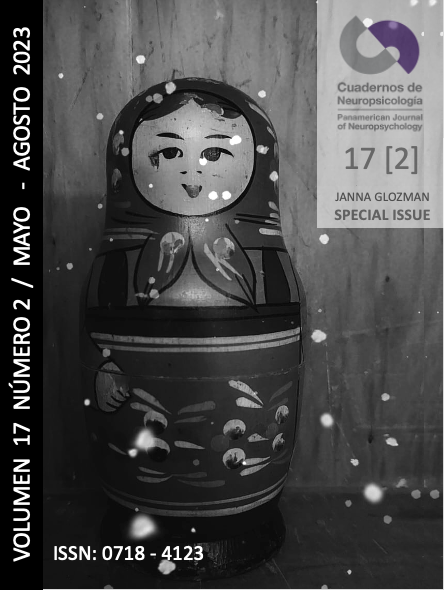Application of principles of cultural-historical neuropsychology to the study of typical development in preschoolers
Abstract
ABSTRACT
It is well known that the development of programming, selective voluntary regulation, and control of goal-directed behavior (executive functions - EF) is a necessary condition for successful school learning. However, methods for assessing EF in preschoolers are rather limited. The article presents neuropsychological instruments for the EF assessment in typically developing children aged 4-7 years, which can be used in individual examinations or in small groups of children. The tests are implemented both in the form of interview and in the form of computer tasks with automatic registration of the child's reactions. The proposed methods are based on the principle of qualitative syndrome analysis proposed by A.R. Luria, as well as on the data of previous study in the field of child cultural-historical neuropsychology (Glozman, Akhutina, Solovieva, among others). The results of the study indicate the geterohronous development of various EF components in the period from 4 to 7 years and the significant progressive changes in most EF components at the age of 6-7 years.
Palabras Clave: funciones ejecutivas, idade pre-escolar, neuropsicologia histórico-cultural.
Â
RESUMEN
Es sabido que el desarrollo de la programación, la regulación voluntaria seletiva y el control del comportamiento direccionado a objetivos (funciones ejecutivas - EF) la condición necesaria para el suceso de la aprendizaje escolar. No entanto, los métodos para avaliar a FE me pre-escolares son bastante limitados. O artigo apresenta instrumentos neuropsicológicos para avaliação de la FE me crianzas como desarrollo tÃpico de 4 a 7 años, que podemos ser utilizados en examas individuales o me pequenos grupos de crianzas. Os testes son implementados tanto en forma de entrevista como en forma de tarefas informáticas como registo automático de las reações de la crianza. Los métodos propuestos se basan en no principio de análisis cualitativo del sÃndrome propuesta por A.R. Luria, bien como nos dados de estudos anteriores en la área de la neuropsicologÃa histórico-cultural infantil (Glozman, Akhutina, Solovieva, entre outros). Los resultados del estudio indican el desarrollo heterogéneo de varios componentes de la FE en perÃodo de 4 a 7 años y las mudanzas progresivas significativas en la mayorÃa dos componentes de la FE en edades de 6 a 7 años.
Keywords: executive functions, preschool age, cultural-historical neuropsychology.
Â
RESUMO
É sabido que o desenvolvimento da programação, da regulação voluntária seletiva e do controle do comportamento direcionado a objetivos (funções executivas - EF) é condição necessária para o sucesso da aprendizagem escolar. No entanto, os métodos para avaliar a FE em pré-escolares são bastante limitados. O artigo apresenta instrumentos neuropsicológicos para avaliação da FE em crianças com desenvolvimento tÃpico de 4 a 7 anos, que podem ser utilizados em exames individuais ou em pequenos grupos de crianças. Os testes são implementados tanto em forma de entrevista como em forma de tarefas informáticas com registo automático das reações da criança. Os métodos propostos baseiam-se no princÃpio da análise qualitativa da sÃndrome proposta por A.R. Luria, bem como nos dados de estudos anteriores na área da neuropsicologia histórico-cultural infantil (Glozman, Akhutina, Solovieva, entre outros). Os resultados do estudo indicam o desenvolvimento heterogêneo de vários componentes da FE no perÃodo de 4 a 7 anos e as mudanças progressivas significativas na maioria dos componentes da FE na idade de 6 a 7 anos.
Palavras-chave: funções executivas, idade pré-escolar, neuropsicologia histórico-cultural.
Downloads
How to Cite
Issue
Section
License
Articles published in this journal are protected under the Creative Commons Attribution-NonCommercial-ShareAlike 4.0 International (CC BY-NC-SA 4.0) license. This means that authors retain full rights over their research and publications at all times. As a journal, we fully respect and promote the principles of open access established by this license, allowing the work to be shared, adapted, and distributed for non-commercial purposes, provided that appropriate credit is given to the authors and any derivative works are licensed under the same terms.
Authors are responsible for obtaining the required permission when they wish to reproduce part of the material (figures, etc.) from other publications.
Likewise, CNPs allows authors to host in their personal sites or other repositories that they deem convenient the Final and Definitive Version of the published article with the format assigned by the journal. In no case do we allow access to preprints of the article under evaluation or already published.
When submitting an article to CNPs you are aware that all the contents of CNPs are under a Creative Commons License. In which it is allowed to copy and share the contents freely, always making reference to the origin of the publication and its author.












